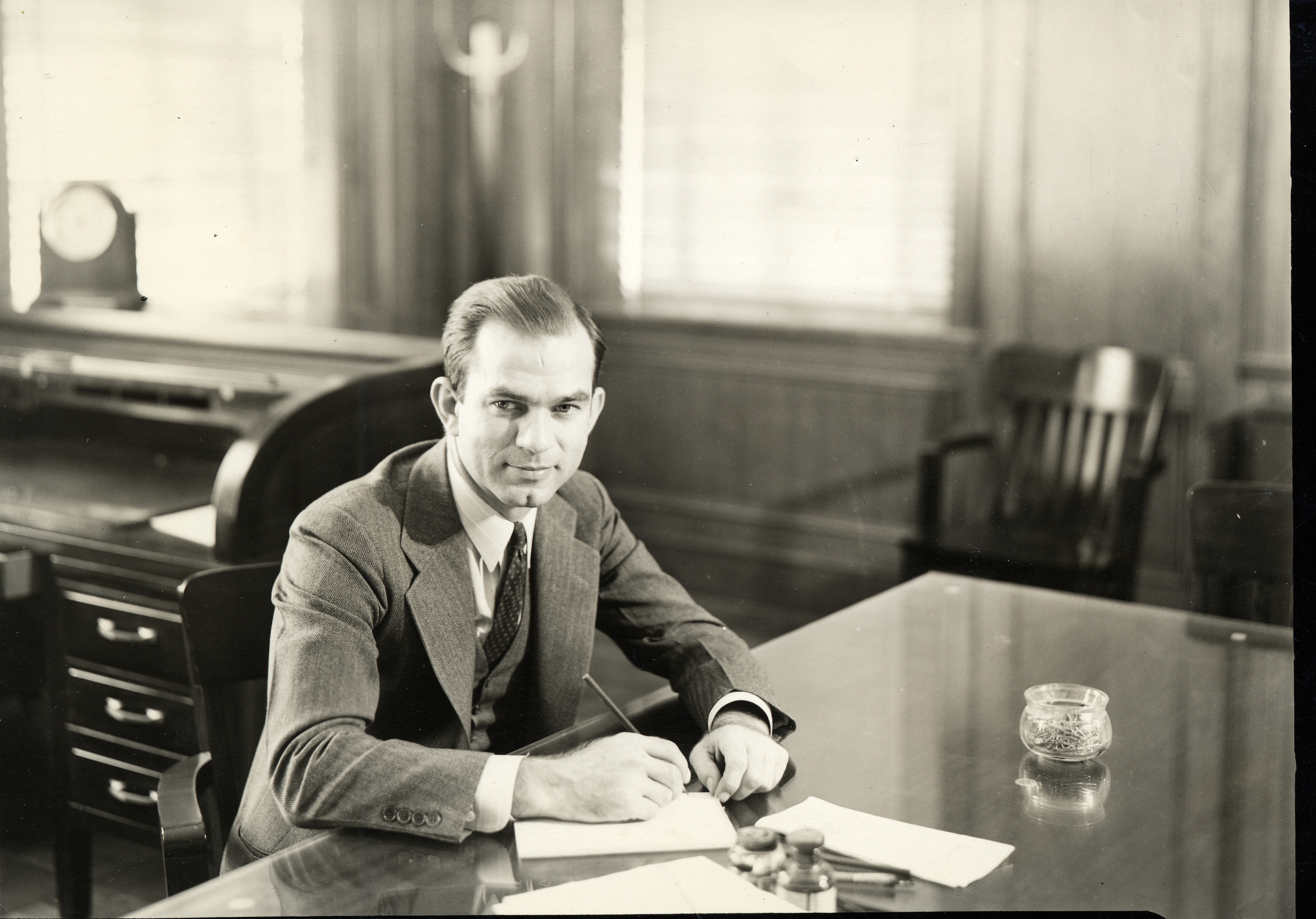
FAYETTEVILLE, Ark. – Fifty speeches delivered by Sen. James William Fulbright (1905-1995), one of the best-known Arkansans in the world, are now available on the University of Arkansas Libraries’ Web site. The digital library collection, titled “A Calm Voice in a Strident World: Senator J.W. Fulbright Speaks,” contains the text of selected speeches, ranging from comments he made regarding his dismissal as president of the University of Arkansas in 1941, to remarks censuring Sen. Joseph McCarthy’s far-ranging investigations, and criticisms of U.S. involvement in the war in Vietnam. The Fulbright speeches are part of the University Libraries’ digital library collections.
 Senator J. William Fulbright (right) with Arkansas Architect Edward Durell Stone
|
 (Left to right) Senator J. William Fulbright with Senator Hubert Humphrey, United Nations Secretary General U. Thant, and Soviet Premier Nikita Krushchev
|
The Libraries’ special collections department digitized the speeches, which represent a small portion of the J. William Fulbright Papers held by the department. Additional information on the Web site, including photographs, a biography, a detailed time line of Fulbright’s life, and a bibliography of materials both by and about Fulbright, provide historical context. The Web site also includes a link to the finding aid for the entire collection of Fulbright papers housed in the special collections department.
Fulbright represented Arkansas in the Congress of the United States for three decades following World War II. During his one term in the House of Representatives and four terms in the Senate, Fulbright was a voice of calm in the halls of Congress, counseling international cooperation, the exchange of information and support for the United Nations.
Although Fulbright attracted national attention by challenging and putting an end to Sen. Joseph McCarthy’s investigative subcommittee, he was best known for his leadership in challenging the wisdom of U.S. policy toward Southeast Asia and his opposition to the Vietnam War.
Today Fulbright’s name is perhaps best known for the educational exchange program he created in the aftermath of World War II. In 1946 he sponsored legislation creating the Fulbright Exchange Program, intended to help people appreciate other nations and cultures. The Fulbright program currently operates in more than 155 countries and has provided more than 285,000 participants the opportunity to study, teach, conduct research and exchange ideas with people in other countries. Through a program of grants to students, scholars, educators and professionals, it is designed to increase international understanding, in order to avoid war and human rights violations.
Tom W. Dillard, head of the special collections department, noted, “J.W. Fulbright was not hesitant to confront those who disagreed with him.” One of the speeches available on the Web site features Fulbright giving his first speech as a freshman in the House of Representatives in 1943. His remarks refuted the flamboyant Republican Rep. Clare Booth Luce, who gave a speech regarding U.S. air policy or “sovereignty of the skies.” Fulbright said, “I am not unconscious of the sparkling beauty and suavity of manner of the Honorable Lady from Connecticut, yet I find that I am not as susceptible to her logic and her persuasion ... as some of my colleagues appear to have been.” The speech ends with a plea for world peace and avoidance of another world war.
Dillard said he hopes the Fulbright digitization project will encourage greater use of the Fulbright papers. He noted, “The J. William Fulbright collection was the first large manuscript collection acquired by the special collections department after it was created in 1967, and it is a veritable window on modern American history.”
After losing his senate seat to Gov. Dale Bumpers in 1974, Fulbright assumed the role of elder statesman. In 1981 the University of Arkansas named its College of Arts and Sciences for Fulbright. He received the Medal of Freedom from President William J. Clinton in 1993. Fulbright died in 1995 at his Washington, D.C., home; he is buried at Evergreen Cemetery in Fayetteville.
Access to the Fulbright speeches is free of charge. Additional information may be obtained by calling the University of Arkansas Libraries’ special collections department at 479-575-5577.
Topics
Contacts
Diane Worrell, Arkansas special projects librarian
University of Arkansas Libraries Special Collectio
479-575-5330,